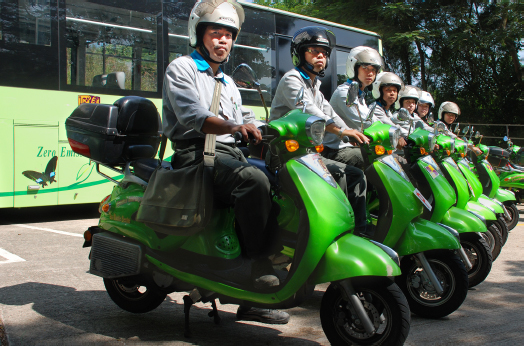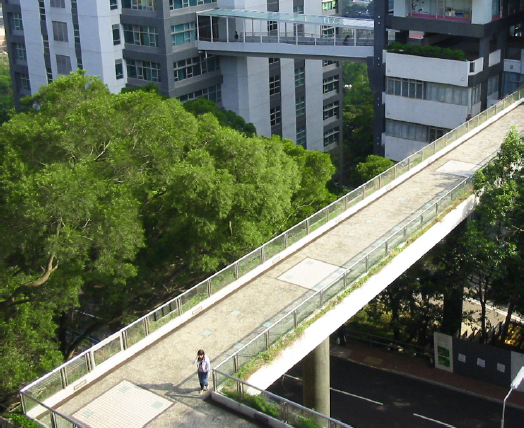CUHK—A Pioneer of Sustainable Mobility
With its vision of a greener Hong Kong and blessed with an abundance of steep and narrow roads, the Chinese University is the only local academic institution to pilot environmentally friendly vehicles for Hong Kong’s public transport sector. This is done through the Government’s Pilot Green Transport Fund which was set up in 2011 to support the testing of eco-vehicles and green transport technologies, with the aim of improving roadside air quality and reducing carbon emissions.


Test-bed for Public Transport
CUHK has the largest fleet of eco vehicles among local universities—a total of 28 electric scooters (40 by the end of 2014), complete with a solar charging station, two electric vans and two electric buses. The vans and the buses which recently arrived on campus, were purchased partially with the Pilot Green Transport Fund. Trials will officially begin in early 2014 and will last for two years. The data collected will be passed on to the Government for reference.
If the vehicles can perform well on the University’s hilly terrain, they should presumably also perform well in most other areas in Hong Kong.
Biodiesel Trials
The University has also worked with the Hong Kong Transport Department to conduct trials on the use of B5 biodiesel on its school buses. The next trial will take place in early 2014. B5 biodiesel, made from recycled waste cooking oil, is also being used in campus standby generators, which has helped to reduce fossil fuel emissions from all generators by 5%.
Walking and Cycling
Alongside efforts to make its vehicular fleet more eco-friendly, the University strives to promote walking and cycling. The University has held a Walk for Health campaign since 2007 to familiarize CUHK members with the several pedestrian routes thoughtfully sculpted on its hilly campus. This year it also launched a ‘Walk for Green’ Programme which allows staff and students to record mileage covered on foot by tapping their staff or student cards on designated readers at starting and finishing points. Members who have racked up a total of, say, 60 walking trips within a seven-month period, are each awarded a ‘Green Walker’ certificate. Students who have reached the target will also receive extra points in their overall Physical Education scores.
Besides the University has held an annual Car-free Day and built a 2km cycling route. The route runs from Area 39 at the northern entrance of the campus to the University MTR station, with parking spaces at the carpark of the Fong Shu Chuen Building and the space adjacent to An Integrated Teaching Building (AITB).

What Is Biodiesel?
Biodiesel is a form of biofuel produced from oils and fats, that can be used in any diesel engine when mixed with mineral diesel. Like ethanol, it’s available in a number of mixes including B5 (5% biofuel, 95% diesel), B10 (10% biofuel, 90% diesel), B20 (20% biofuel, 80% diesel), B80 (80% biofuel, 20 diesel) and B100 (100% biofuel). Studies have shown that replacing diesel with biodiesel can significantly reduce air pollution. Regular diesel engines that use fuel with 20% biodiesel can decrease the amount of sulphates and hydrocarbons in the exhaust by approximately 20% and the amount of particulates by 12%. With pure (100%) biodiesel, the benefits are even greater. This is worth considering for Hong Kong where diesel vehicles are a major contributor to roadside air pollution.
Pollution by Transport Sector
According to the Environmental Protection Department, the transport sector, including road and marine transport, was the second largest air pollution source in Hong Kong in 2010, accounting for about 57% of the local respirable suspended particulates, 62% of nitrogen oxides and 48% of sulphur dioxide. The sector is also responsible for about 17% of local greenhouse gas emissions. What’s more, exhaust emissions from motor vehicles are the main cause of roadside air pollution.



